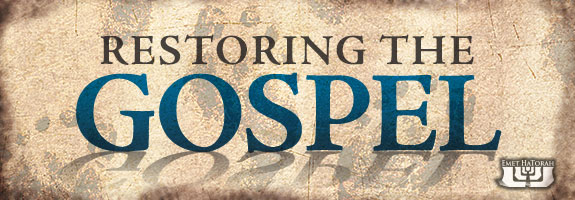Restoring the Gospel - Part 3
Series:

When we speak of the Gospel, we need to know what we are talking about. We need to know what the Bible calls the Gospel, rather than what our doctrines and traditions have called the Gospel. Let’s begin by looking at the Gospel message of John the Immerser.
The Good News of John the Immerser
After the foretelling of the birth of John the Immerser to Zechariah by the angel, we don’t hear anything more about John until he appears in the wilderness near the Jordan proclaiming his message of repentance.
In those days John the Baptist came preaching in the wilderness of Judea, “Repent, for the kingdom of heaven is at hand.” For this is he who was spoken of by the prophet Isaiah when he said, “The voice of one crying in the wilderness: ‘Prepare the way of the Lord; make his paths straight.’” (Matthew 3:1–3)
John proclaims his message with fervent passion, calling on all who hear his voice to repent and be immersed in the Jordan. His message was simple, “Repent, for the kingdom of heaven is at hand.” This message breaks down into two basic components: Repentance and Kingship. But we need to ask a few questions. First, what do these mean, and what was John trying to convey in his message of Repentance and Kingship? Next, is this proclamation John’s Gospel? Let’s begin answering our first question related to the meaning of John’s message. What does John want us to understand in relationship to Repentance and Kingship?
We have previously learned (in our teaching “Repentance from Dead Works”), “repent” means to stop sinning and turn to God’s righteous standard of living found within His Torah. It means to turn from the direction of living for oneself and turn towards a life devoted to God. But does this coincide with John’s use of repentance? Immediately following his call to repentance, John begins clarifying what he means by repentance. He says,
Bear fruits in keeping with repentance. And do not begin to say to yourselves, ‘We have Abraham as our father.’ For I tell you, God is able from these stones to raise up children for Abraham. Even now the axe is laid to the root of the trees. Every tree therefore that does not bear good fruit is cut down and thrown into the fire. (Luke 3:8–9)
The first thing he tells his audience is why they have a need for repentance and that repentance is not a one-time event. “Bear fruits in keeping with repentance … Every tree therefore that does not bear good fruit is cut down and thrown into the fire.” He also warns them to not count on any kind of imputation of righteousness from the patriarchs, because they will be judged according to their deeds, not the covenant made with their forefather.
The crowd asked for a clarification on how to live a life of repentance. John responds by saying,
“Whoever has two tunics is to share with him who has none, and whoever has food is to do likewise.” Tax collectors also came to be baptized and said to him, “Teacher, what shall we do?” And he said to them, “Collect no more than you are authorized to do.” Soldiers also asked him, “And we, what shall we do?” And he said to them, “Do not extort money from anyone by threats or by false accusation, and be content with your wages.” (Luke 3:11–14)
He wanted his audience to be certain that his baptism wasn’t merely a washing away of their sins, but rather a wiping away of the past and a declaration of a new life directed toward God and His righteous ways.
In relationship to Kingship (“… for the kingdom of heaven is at hand”), John engages his audience with an announcement regarding Yeshua.
“I baptize you with water, but he who is mightier than I is coming, the strap of whose sandals I am not worthy to untie. He will baptize you with the Holy Spirit and fire. His winnowing fork is in his hand, to clear his threshing floor and to gather the wheat into his barn, but the chaff he will burn with unquenchable fire.” (Luke 3:16–17)
He proclaims (in figurative terms) that Yeshua is the long-awaiting Messiah-King of Israel and has come in power with his Kingdom. He will gather in the righteous and subjugate the wicked, because his “kingdom is at hand.” In other words, he — Yeshua, as the King of Israel — is present and all people now have the opportunity to throw off the yoke of sin and come under the yoke of his kingship.
Now that we have dissected John’s message, we must now turn to the question, “Is this message, indeed, John’s Gospel?”
So with many other exhortations he preached good news to the people. (Luke 3:18, ESV)
The KJV down plays it by translating this verse to say, “And many other things in his exhortation preached he unto the people.” But the NASB makes it explicit, “So with many other exhortations he preached the gospel to the people.” Both the ESV and the NASB more accurately reflect the Greek behind this text. A more accurate way to capture the sense of this text is that John “gospelated,” which sounds unnatural in English. In other words, he proclaimed the good news. What good news? “Repent, for the kingdom of heaven is at hand.” John’s good news, his Gospel, centered around the themes of Repentance and Kingship. His Gospel message was, “Repent, for the kingdom of heaven is at hand.”
In our next post we will explore the Gospel message of Yeshua and compare it to that of John.








